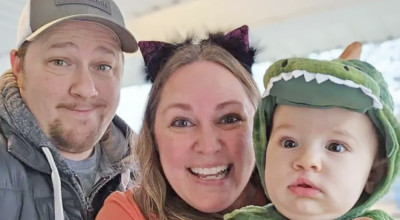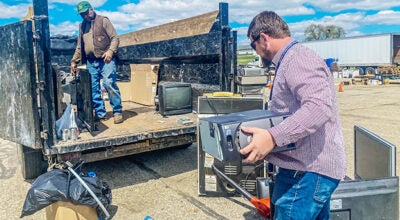SMC speaker survives quake
Published 10:52 am Friday, January 15, 2010
By JOHN EBY
Dowagiac Daily News
Anxious Dowagiac residents heaved a sigh of relief Thursday afternoon at news that Hilda Alcindor and the Haiti nursing school where she is dean both survived the earthquake.
“At noon we did not know if our friend Hilda Alcindor was alive or if the school was still standing,” said Dr. Fred L. Mathews, chairman of the Southwestern Michigan College Board of Trustees, who hosted her last May as SMC’s 42nd graduation speaker.
Mathews visited Haiti in December 2007.
“We just got the good news from the Haiti Nursing Foundation through Dr. (James) Wierman that Hilda is alive and the school survived,” although one student died away from campus at her home in Leogane.
Dr. Mathews began collecting contributions and left Rotary Club with three checks. “The school and students need help to get through this crisis,” he said. “They have little or nothing.” Checks can be made out to the Haiti Nursing Foundation and given to Mathews.
The foundation in Ann Arbor hand-delivers donations to the school and supervises expenditures, so “you know your money gets to where it should go,” he said.
Hôpital Sainte Croix (Holy Cross Hospital, 125 beds) in Leogane, a mile from the nursing school, was reported as collapsed.
However, a later report described it as “cracked but standing.”
Dr. Wierman, who was preparing another medical mission trip to Haiti in March involving 19 Dowagiac residents, said, “We now know that Suzi and John Parker are OK, but the apartments and the guest house is down. St. Croix is standing but damaged … This would make it very difficult to go in any meaningful or useful way.”
A Haitian-born U.S. citizen, Alcindor was appointed dean in the fall of 2004. She is fluent in English, French and Creole.
“My mission is to have the Haitian population – my people – fulfill the dream. My mission is to prepare competent, professional nurses able to provide quality – quality! – nursing care. Thirdly, prepare dedicated nurses who will participate in the education of the population at large … to prevent diseases and promote good health … Being in Haiti right now is a calling for” the mother of two.
She said at SMC last spring that she had been in church that fateful August 2004 day, trying to determine the purpose of her life.
When she went outside and got into her car, her phone rang.
“I thought it was God,” but it led to contact with persuasive Ruth Barnard, who insisted, “If anybody can be a dean, you can.”
“I’m not from Leogane, but northwest Haiti,” Alcindor said.
After her first visit, “I was not going there. I had a great job” in Florida.
By November, she was expected to open the school in January.
Thirty-seven students started Jan. 10, 2005.
“Since then, I’ve been wearing so many hats, that’s why I don’t have any hair,” she smiled. “I’m dean, I’m the administrator, I’m the cook and housekeeper, I teach 10 classes and I have to travel to do fundraising in America every four to six weeks. I graduated as a nurse in 1971 in Haiti and spent two years in the operating room of a hospital and I worked about eight months at Albert Schweitzer, where Dr. Wierman used to go a lot in Haiti.
“To leave Haiti then you needed special permission. In 1974, they didn’t want teachers, doctors of nurses to leave Haiti. I went to the minister of health for permission to go to the United States. I said I would be back in two years, but I stayed here for 30 years. God was preparing me to go back. The Air Force helped me become who I am with discipline and organization. At the school, I’m ‘The General,’ even though I didn’t get to be an officer in the Air Force.”
Operating costs $3,000 per student per year, including tuition, room and board, textbooks, uniforms, supplies, electricity, maintenance, Internet access and travel to clinical sites. Tuition alone costs $800.
An Ann Arbor-based 501(c)(3) non-profit foundation was established in 2005 to provide funding to improve nursing (www.haitinursing.org).
Joining Alcindor in Dowagiac was Haiti Nursing Foundation President Rosemarie Rowney, a public health nurse for almost 40 years.
“This nursing school is ‘give me a fish, I eat for a day, teach me to fish, I eat for a lifetime.’ I was so proud and privileged to be at the two-day graduation of the first class. Family members came from across the country in open-air trucks with rocking chairs in the back. They had their best clothes on. It was one of the proudest, emotional moments you can imagine to witness. These young people carried themselves with such dignity and respect for themselves and for the country, so proud of their accomplishment. Three men are probably the first male nurses in the whole country of Haiti. We’ll be back in September when another class graduates.”
Just as co-founder and first HNF president Ruth M. Barnard, Ph.D., RN, who taught at the University of Michigan, recruited Alcindor as dean, she personally selected Rowney to succeed her when she became board treasurer.
“What we are doing in Haiti probably has more of an impact than anything U.S. citizens can do in another country that is so impoverished. It’s a difficult time economically to talk to people about aiding. And, who knows? We may also be in the middle of an influenza pandemic. I did influenza pandemic planning for my own University of Michigan School of Nursing. It’s a difficult time in the world and we may have to live more simply ourselves so others can simply live. That’s my philosophy,” Rowney said.
“Swine flu? We’re not going to know about it in Haiti. We live the flu every day,” Alcindor said. “Haiti is in your backyard. When I go to large universities, they’re talking about Africa, China, Europe. Haiti’s right there, an hour and a half from Miami. It’s cheaper to go to Haiti, which is part of the Americas. There are about 2 million Haitians in the United States. Everybody’s nervous about Mexico. If something happens in Haiti, you’re going to be nervous, too. Haiti was occupied by the Americans from 1915 to 1934 who started the first nursing school and the first medical school in Haiti. I challenge all of the nurses here to continue that work of the American people. If I have more nurses helping me, I don’t have to teach 10 classes. I can do other things for the school. When a nursing student is in his neighborhood, he is the only (medical resource) available. One who has graduated now told me that junior year people were coming to him for everything and they paid him for it. Even in the making of nurses, we are helping Haitian people put food on the table. Haiti lacks three things: education, education and education. Piggybacked on that at the school is leadership. We graduated 13 – three men, 10 women – and retained four of them. We are nurturing them for our own faculty to continue the mission. We’re not going to be a developed country tomorrow. It’s going to take a while and a lot of work, but Haiti is in your backyard and you can help. You can have all the money you want, but if you don’t have health, it’s difficult to sustain. I don’t know how I’m making it, but I am because God is so good to me. In the United States, I suffered from migraines that kept me home for three days. I couldn’t work. Now, I haven’t had a migraine in the four years” since she returned to Haiti.
There were 105 students enrolled, including 17 men.
“I’m so proud of my guys,” Alcindor said. “In Haiti, ‘men don’t go to nursing school.’ It’s a macho country, but they do very well.”






